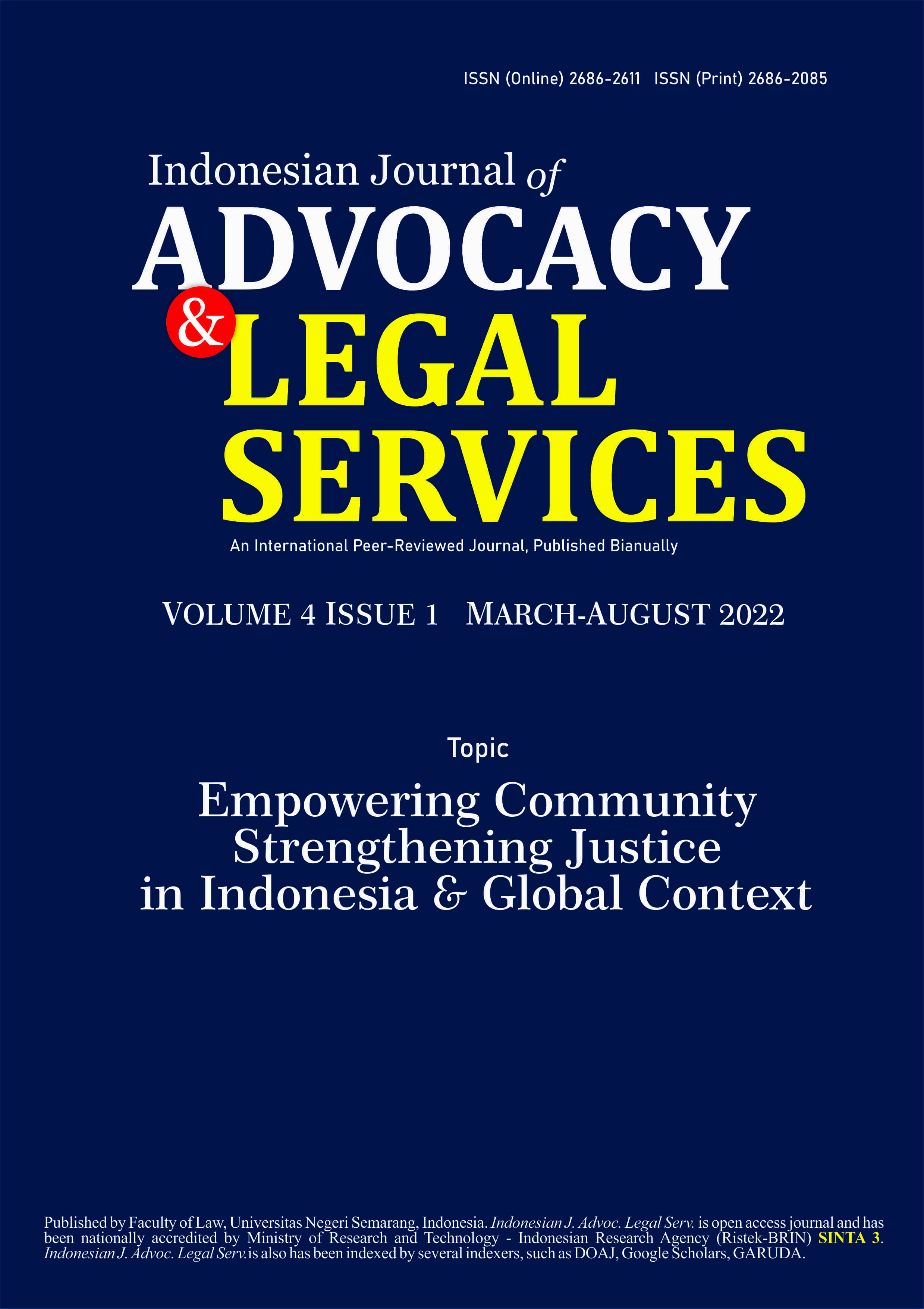Contribution of Islamic Law Concerning The Death Penalty to the Renewal of Indonesian Criminal Law
Main Article Content
Abstract
This paper aims to describe and analyze the contribution of Islamic law in the regulation (policy formulation) of the death penalty in the context of reforming the national criminal law. Determining the death penalty as a means to tackle crime is a policy choice because capital punishment is a pro and con issue among legal experts. Because the debate about the death penalty is related to the right to life which in international legal instruments and the 1945 Constitution is included in the category of rights that cannot be reduced under any circumstances (non-derogable rights). Islamic law recognizes the death penalty in a crime that has been determined by Allah SWT. in the Al-Qur’an. The death penalty in Islam gives its color with the idea of balance that does not only focus on the perpetrators of the crime but also the victim. Of course, this idea of balance is following the basic values of Pancasila. The death penalty in Islam in the qishahs punishment recognizes the concept of forgiveness from the victim’s family which needs to be developed in the future, especially in the draft Criminal Code which until now has not been ratified as a means for national law reform.
Article Details

This work is licensed under a Creative Commons Attribution-NonCommercial-ShareAlike 4.0 International License.
The Authors(s) retain copyrights of the Article published on Indonesian J. Advoc. Legal Serv. However, before publishing, it is required to obtain written confirmation from Author(s) in order to ensure the originality (Author Statement of Originality). The statement is to be signed by at least one of the authors who have obtained the assent of the co-author(s) where applicable. This work licensed under a Creative Commons Attribution-NonCommercial-ShareAlike 4.0 International (CC BY-NC-SA 4.0).
References
Afdal, Windi. “Islamic Law Codification: The Friction on Authority of Islamic Law Establishment”. JILS (Journal of Indonesian Legal Studies) 1, No. 1 (2017): 35-46. https://doi.org/10.15294/jils.v1i01.16567.
Al-Syatiby, Abu Ishaq. Al-Muwafaqat Fi Ushul Al-Ahkam. (Beirut Lebanon, Dar al-fkr, n.d).
Arief, Barda Nawawi. Bunga Rampai Kebijakan Hukum Pidana. (Bandung, Citra Aditya Bakti, 2005).
Arief, Barda Nawawi. Masalah Penegakan Hukum Dan Kebijakan Hukum Pidana Dalam Penanggulangan Kejahatan. (Jakarta, Kencana, 2007).
Arief, Barda Nawawi. Pembaharuan Hukum Pidana dalam Perspektif Kajian Perbandingan. (Bandung, Citra Aditya Bakti, 2005).
Lev, Daniel S. Hukum dan Politik di Indonesia; Kesinambungan dan Perubahan. (Jakarta, LP3ES, 2018).
Lubis, Fadil Nur. Hukum Islam dalam Kerangka Teori Fikih dan Tata Hukum Indonesia. (Medan, Pustaka Wedyasarana, 1995).
Maghfirah, Aliflanya Arisandy, Diny Arista Risandy, and Nurindah Hilimi. “Sulh’ in Islamic Criminal Law as The Form of Restorative Justice: A New Framework in Indonesian Criminal Law.” Proceedings. Proceeding of Scientific Cooperations 2nd International Conference on Social Sciences of Istambul Turkey, 2nd-3rd of April. 2016.
Mahfud MD, Muhammad. Membangun Politik Hukum, Menegakkan Konstitusi. (Jakarta, PT. RajaGrafindo Persada, 2012).
Mubarok, Nafi. “Pidana Qisas dalam Prespektif Penologi.” Al-Qanun: Jurnal Pemikiran dan Pembaharuan Hukum Islam 20, No. 2 (2017): 473-487. https://doi.org/10.15642/alqanun.2017.20.2.473-487
Munajat, Makhrus. Dekonstruksi Hukum Pidana Islam. (Yogyakarta, Logung Pustaka, 2004).
Qodri, Azizy A. Eklektisisme Hukum Nasional; Kompetisi Antara Hukum Islam Dan Hukum Umum. (Yogyakarta, Gama Media, 2002).
Rohman, Anas. “Qishash Law and Human Rights.” TAWASUT 7, No. 02 (2020). http://dx.doi.org/10.31942/ta.v7i02.5394
Rumadi, Marzuki. Fiqh Madzhab Negara; Kritik Atas Politik Hukum Islam Indonesia. (Yogyakarta, LKiS, 2001).
Siregar, Hasnil Basri. “Lessons learned from the implementation of Islamic shari’ah criminal law in Aceh, Indonesia.” Journal of Law and Religion 24, No. 1 (2008): 143-176. https://doi.org/10.1017/S074808140000196X
Shihab, M. Quraish. Membumikan Al-Qur’an. (Bandung, Mizan, 1992).
Thani, Shira, and Alvi Syahrin. “Contribution of Islamic Law in The Development of Corruption Criminal Law.” PalArch's Journal of Archaeology of Egypt/Egyptology 18, No. 1 (2021): 456-465. https://archives.palarch.nl/index.php/jae/article/view/2058.
Wahyuningsih, Sri Endah, and Jawade Hafidz. “The Development of The Indonesian Criminal Code Derived from The Yudicial Pardon Value in Islamic Law.” Addin 11, No. 2 (2017): 295-320. http://dx.doi.org/10.21043/addin.v11i2.2475
Yani, Ahmad, and Megawati Barthos. “Transforming Islamic Law in Indonesia from a Legal Political Perspective.” Al-Ahkam 30, No. 2 (2020): 159-178. https://doi.org/10.21580/ahkam.2020.30.2.6333
Zainuddin, Zainuddin. “Restorative Justice Concept on Jarimah Qishas in Islamic Criminal Law.” Jurnal Dinamika Hukum 17, No. 3 (2017). http://dx.doi.org/10.20884/1.jdh.2017.17.3.826
Zaenal, Moehadi. Pidana Mati: Dihapuskan Atau Dipertahankan. (Yogyakarta, Hanindita, 1984).
